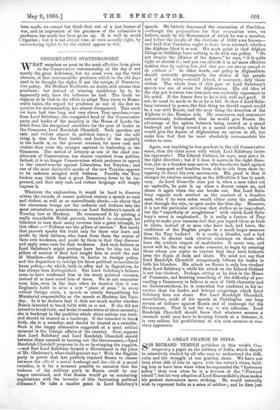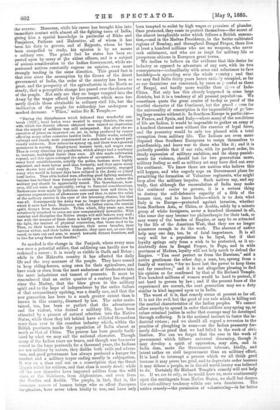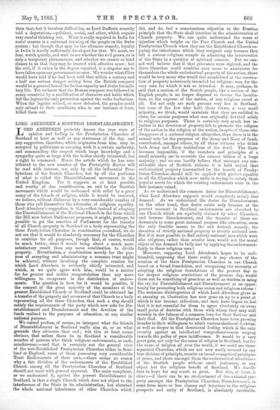A GREAT CHANGE IN INDIA.
SIR RICHARD TEMPLE publishes in this week's Contemporary a paper on the soldiery of India, which should be attentively studied by all who care to understand the difficulty and the strength of our position there. We have not been often able of late to agree with the writer's views, holding him to have been wiser when he expounded the "Lawrence policy" than now when he is a devotee of the "Forward school "; but his very adoption of Lord Beaconsfield's ideas makes his present statements more striking. He would naturally wish to represent India as a mine of soldiers; and he does just the reverse. Moreover, while his career has brought him into immediate contact with almost all the fighting races of India, giving him a special knowledge in particular of Sikhs and Punjabees, Pathans and Mahrattas, all of whom it has been his duty to govern, and of Rajpoots, whom he 'has been compelled to study, his opinion is by no means a solitary one. The grand fact he states has been reported upon by many of the ablest officers, and is a subject of serious consideration to the Indian Government, while experieneed natives constantly express an opinion, even more strongly tending in the same direction. This grand fact is that ever since the assumption by the Crown of the direct government of India, the order of the country has been so great, and the prosperity of the agriculturists in the North so steady, that a perceptible change has passed over the character of the people. Not only are they no longer tempted into the Army by the wages offered by Government, which were formerly double those obtainable in ordinary civil life, but the inclination of the people for soldiership has undergone a marked decrease. "When," writes Sir R. Temple,—
"During the disturbances which followed that wonderful outbreak [1857], local levies were wanted in many districts, the ease with which the district officers obtained men caused an impression that the supply of soldiers was still unimpaired. Bat after the restoration of peace an improved era set in being produced by causes affecting many other countries besides India. Public works, notably railways and canals, were constructed on a scale and at a speed previously unknown. New industries sprang up, and there was a general movement in society. Employment became brisk, and wages rose. Thus in every direction the population, which always had a tendency to increase, multiplied faster than ever. All this made cultivation expand, and this again enlarged the sphere of occupation. Farther, many local establishments, notably the police, became more highly organised, and were better paid than formerly, and thus again many were drawn into civil employ. The police, particularly, engaged many who would in former days have enlisted in the Army or joined local levies. Thus able-bodied men, affording good fighting material, became less inclined than formerly to enlist in the Army, unless the military pay should be appreciably raised. The Government, however, did not raise it appreciably, owing to financial considerations. Igndeavours were made by judicious concessions here and there, by ' cautions augmentation of allowances now and then, to raise the value of the military service in the eyes of the labouring classes, but that was all. Consequently the Army was no longer the prize profession which it once had been. Moreover, with the Indian races, the martial spirit decays from desuetude. Tribes which, fifty years ago, were notoriously attached to arms are now comparatively unwarlike. With training and discipline the Native troops will still behave very well ; but with the masses of them there is hardly now the predilection for the fight, the instinct of physical contention, that there used to be. Then, as their homes become happier, their acres broader, their harvest richer, and their habits domestic, they care not, as erst they cared, to tarn out and arm to march towards distant frontiers, and to live far away from their families."
So marked is the change in the Punjaub, where every man was once a potential soldier, that soldiering can hardly now be reckoned a career ; it is nearly as visible in Oudh and Behar ; while in the Mahratta country it has affected the daily life and the very manners of the people. They have ceased to keep riding-horses, using oxen for their agriculture, and have sunk or risen from the most audacious of freebooters into the most industrious and tamest of peasants. It must be remembered that an entire quarter of a century has elapsed since the Mutiny, that the blow given to the military spirit and to the hope of independence by the entire failure of that extraordinary uprising, was a deadly one, and that the now generation has been to a much greater extent than is known in this country, disarmed by law. The order maintained, too, has been so perfect that the adventurous and the violent, who desired a military life, have been attracted by a process of natural selection into the Native States, while those they left behind have addicted themselves more than ever to the ceaseless industry which, within the British provinces, marks the population of India almost as much as that of China. The process has been greatly facilitated by what we may call the national character. Though many of the Indian races are brave, and though war has never ceased in the huge peninsula for a thousand years, the Indians are not military by nature, they dislike both exile and adventure, and good government has always produced a hunger for comfort and a military torpor ending usually in subjugation. It was on a class and not on a conscription that the Great Moguls relied for soldiers, and that class is nearly dead ; while all the new dynasties have imported soldiers from the wild clans of the Suleiman, from Afghanistan, and even from the Soudan and Arabia. he people, in fact, that is, the immense masses of human beings who so affect European imagination, have never taken kindly to war, and have only been tempted to enlist by high wages or promises of plunder. Once protected, they cease to protect themselves—the secret of the almost inexplicable order which follows a British annexation,—and in the Madras Presidency, in the better cultivated regions of Bombay, and throughout Bengal Proper, there live at least a hundred millions who use no weapons, who never seek enlistment, and who are as inapt for military life as prosperous citizens in European great towns.
We incline to believe on the evidence that this desire for industry as opposed to adventure of any sort, with its two consequences—unfamiliarity with arms and reluctance to face hardship—is spreading over the whole country ; and that we may find India thirty years hence entitely occupied, so far as our dominions are concerned, by races as p-aceful as those of Bengal, and hardly more warlike than thoes of IndoChina. Not only has this already happened in some large districts, but it is a tendency of all peasant populations. We sometimes quote the great armies of to-day as proof of the martial character of the Continent, but the grand i ason for the universality of conscription is the impossibility of ga'hering large armies without it. In Southern Europe in particular— in France, and Spain, and Italy—where many of the conditions of life are Indian, it would be impossible to gather an army of a hundred thousand men without the exercise of legal force, and the peasantry would be only too pleased with a total exemption from military life. The Indians are even more disposed than Southern Europeans to resign themselves to guardianship, and leave war to those who like it ; and it is perfectly possible that if our rule, with its perfect order, its steady repression of military ambition, and its sharp punishments for violence, should last for two generations more, military feeling as well as military art may have died out over the continent. We know there are natives who believe this will happen, and who eagerly urge on Government plans for permitting the formation of Volunteer regiments, who might keep alive the military impulse. Such natives say, and say truly, that although the emasculation of India may make the continent easier to govern, it is a serious thing to destroy the self-defensive capacity of a fifth of the human race, and to leave India—which is to Asia what Italy is to Europe—protected against invasion, whether from Northern Asia, or China, or Arabia, solely by a minute group of white foreigners, never a hundred thousand in all, who some day may become too philanthropic for their task, or may weary of the burden of Empire, or may be so attracted by the life of the American West, that they are no longer numerous enough to do the work. The absence of native help may one day, too, be of fatal importance. It is all very well for a population to be loyal, but if that loyalty springs only from a wish to be protected, as it undoubtedly does in Bengal Proper, in Pegu, and in wide provinces of Madras, loyalty will not help much to defend the Empire. "You must protect us from the Russians," said a native gentleman the other day, a man, too, sprung from a family of warriors, " for-we have lost the power to keep them out for ourselves ;" and it is not altogether pleasing to find his opinion so far confirmed by that of Sir Richard Temple. Two hundred millions of women would be hard to protect, if not hard to govern by law ; and if the present fears of the experienced are correct, the next generation may see a duty similar in kind imposed upon us in India.
The worst of it is, that remedy seems at present so far off. It is not the evil, but the good of our rule which is killing out the martial characteristics of the Indian peoples. We cannot allow anarchy to spread in order that soldiers may spring up, or refuse criminal justice in order that courage may be developed through suffering. It is the national instinct to foster the industrial virtues ; and we should all regard a reversion to the practice of ploughing in arms—as the Indian peasantry formerly did—as proof that we had failed in the work of civilisation. Nor can we forget that the ease in the work of government which follows universal disarming, though it may develop a spirit of oppression, may also, and in India does, make the Government tolerant, kindly, and intent rather on civil improvement than on military effort. It is hard to interrupt a -process which we all think good because it may prove too good, and to depreciate order because it may debase a people, as in the old world luxury was believed to do. Certainly Sir Richard Temple's remedy will not help us. If we are to rely, as he would have us, more continuously upon the contingents from Native States, we shall but deepen the anti-military tendency within our own dominions. The native remedy—the permission of volunteering—is far better than that, but it involves difficulties, as Lord Dufferin recently told a deputation,—political, social, and other, which require very careful thinking out. What is really required in India for social reasons is a universal training of the people on the Swiss system ; but though that may be the ultimate remedy, loyalty in India is hardly sufficiently developed for that. We must, we fear, watch quietly, and wait to see whether the evil grows, or is only a temporary phenomenon, and whether we cannot so bind classes to us that they may be trusted with effective arms ; but the evil, if it exists in the degree reported, is a singular one to have fallen upon our government so soon. We wonder what Clive would have said if he had been told that within a century and a half one serious danger arising from the British conquest would be a general loss of the Indian capacity and desire for military life. Yet we know that the Roman conquest was followed in many countries by a modification of character and habit which left the legions the only protection against the ruder barbarians. When the legions retired, or were defeated, the peoples could only submit to their assailants, who, in one instance at least, killed them out.




































 Previous page
Previous page